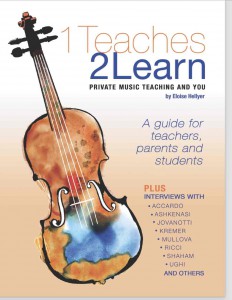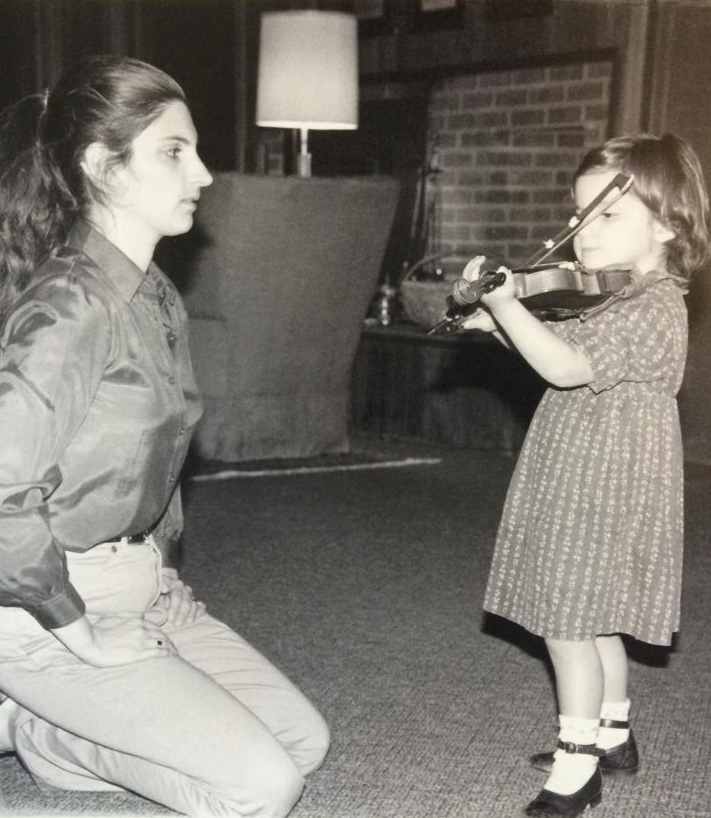Advocating for Our Students, Part 1
“I have a student who has recently been prescribed ADHD meds and I see a difference in her behavior. She was already quite subdued but now mostly stares blankly in class and doesn’t seem to register simple questions and requests unless I repeat them. The parents think it’s the online lessons that are causing the problem even though I noticed this change before we started online. What can I do?”
Reading this perplexed and distressed teacher’s plea for some advice on what to do with her student made me think back to all the times I have had to take a deep breath and inform disbelieving parents of problems or situations they were sure did not exist or were just unaware of.
Violin teachers have a very intense one-on-one relationship with students, some of whom begin lessons with us even before they even start school. We may be the only neutral adult in our students’ lives who has a continuing relationship with them for many years. Often we see potential problems or situations that may need to be addressed before their school teachers do and even before the parents may realize what is going on.
Parents understandably tend to trust doctors, therapists and others in positions of authority, forgetting that these excellent and well-intentioned experts are also human and can make mistakes and errors in judgment which, no matter how small, can make an enormous difference in a child’s life. Parents may assume that if a child is getting medication, it’s because she needs it and that’s it. In the above case, the parents think that their child’s problems are being caused by online lessons instead of their child’s meds. The idea that the dosage of the medicine could be incorrect probably hasn’t occurred to them and they may feel they are not qualified to question their doctor about it. They may think their daughter is now better behaved or calmer. Or perhaps the child’s school teachers are telling them that they see improvement of some kind. Also, sometimes parents are so busy with work, other children, and life in general that they may unquestioningly allow those whom they see as authorities to take more responsibility for their child’s well-being than perhaps may be best in the long run. They may also forget that the doctor sees very little of their child and you, the teacher, spend a lot more “quality” time with her, often over years and, unlike the parents who see their child every day, you see the child once a week. This puts you in a rather unique position of observation, meaning it might be easier for you to notice a change in the physical or emotional well-being of your student.
So, what to do? It’s easy for me to give advice as I don’t have to bear the consequences of it, but here it is. I would ask to speak to the parents alone, tell them what is going on in the lesson, that the change in behavior presented itself before the online lessons started, and that perhaps they might want to have a chat with their therapist to see if he or she thinks this behavior is caused by the prescription medicine and if this is how the child should be reacting to it. I would even offer to talk to the therapist if any one thinks that would be helpful.
Yes, this is intrusive. Yes, it is risky. But if you don’t say something, there is a chance that no one will. You might lose the student if the parents become offended. But if you think of it, in the case above she already is lost. How can you give a lesson to someone in an almost catatonic state? It is worth the risk to have a talk with the parents. If the parents choose to ignore your observations, well at least you have tried. Be aware that if you do bring up the something to discuss, that you must be prepared to back up your observations and you might have to be persistent in ensuring that the parents understand what you are trying to communicate.
Sometimes kids don’t know even know they have a problem or they just don’t talk to their parents about it. And even if they do, their parents may not believe them or give any weight to it. Therefore, we may find ourselves in the sometimes uncomfortable position of having to speak up for our students when no one else is noticing or listening.
In the next post I will give some examples of the sorts of situations I have run into in my long career . . .
Post author: Eloise Hellyer
Share this:
Buy it on www.sharmusic.com - eBook format, avaliable worldwide, paperback in North America
COPYRIGHT
ABOUT
A music teacher’s thoughts and observations on the teaching and the study of a musical instrument, hoping to be of help to parents, students and teachers.
PHOTO
AWARDED TOP 25 VIOLIN BLOG
CATEGORIES
TAGS
ARCHIVES
-
Agosto 2022
Agosto 2023
Agosto 2024
April 2015
April 2016
April 2017
April 2019
April 2020
Aprile 2022
Aprile 2023
Aprile 2024
August 2014
August 2015
August 2016
August 2017
August 2018
August 2019
August 2021
December 2014
December 2015
December 2016
December 2017
December 2018
December 2019
December 2020
Dicembre 2022
Dicembre 2023
Dicembre 2024
Febbraio 2022
Febbraio 2023
Febbraio 2024
February 2015
February 2016
February 2018
February 2019
February 2020
February 2021
Gennaio 2022
Gennaio 2023
Gennaio 2024
Giugno 2022
Giugno 2022
Giugno 2023
Giugno 2024
January 2015
January 2016
January 2017
January 2018
January 2019
January 2020
July 2015
July 2017
July 2019
June 2016
June 2017
June 2018
June 2019
June 2020
June 2021
Luglio 2022
Luglio 2023
Luglio 2024
Maggio 2022
Maggio 2023
Maggio 2024
March 2015
March 2016
March 2017
March 2018
March 2019
March 2020
March 2021
Marzo 2022
Marzo 2023
Marzo 2024
May 2015
May 2016
May 2018
May 2019
May 2020
November 2014
November 2015
November 2016
November 2017
November 2018
November 2019
November 2021
Novembre 2022
Novembre 2023
Novembre 2024
October 2014
October 2015
October 2017
October 2018
October 2019
October 2020
October 2021
Ottobre 2022
Ottobre 2023
Ottobre 2024
September 2014
September 2015
September 2016
September 2018
September 2019
September 2020
September 2021
Settembre 2022
Settembre 2023
Settembre 2024
RECENT POSTS
Terry G and Me, or Terry Gilliam on Where (or What) Practicing the Piano Will Get You…
The Teaching We Don’t Do Is More Important Than We Think
Overwhelmingness or What Teaching and Motherhood* Have in Common
Cellphone Serenity
How to Build Your Reputation – the Kind You Want
Desperate Times, Desperate Measures. Or How to Deal With Your Strong-Willed Stubborn Student and Survive
“Why Does My Teacher Get So Frustrated?” Letter to a Perplexed Student
Mount Rush-no-more….And How to Get There
Realizzato con VelociBuilder - Another Project By: Marketing:Start! - Privacy Policy




